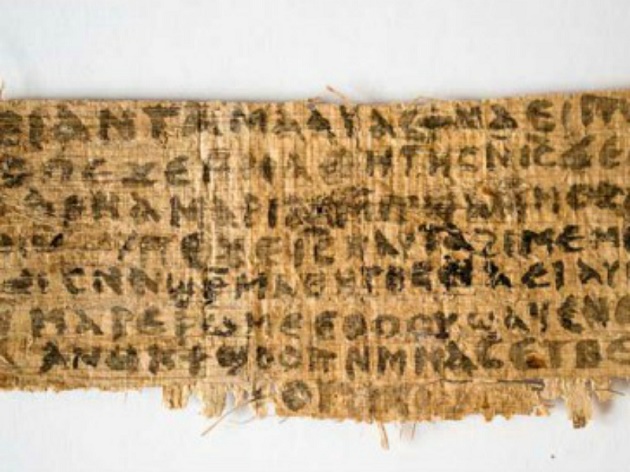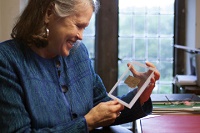Karen L. King’s announcement got much media attention in 2012. After and in-depth research of The Atlantic magazine, she admits she probably was deluded by “fabrications.”
 The fragment Karen L. King introduced to the public in 2012. / Photo: Karen L. King
The fragment Karen L. King introduced to the public in 2012. / Photo: Karen L. King
The “Gospel of Jesus’ wife” was most probably a forgery, the Harvard scholar who made it famous now admits.
In an interview with The Boston Globe, Karen L. King admits that “it appears now that all the material [owner] Fritz gave to me concerning the provenance of the papyrus … were fabrications.”
Walter Fritz is the one who first gave the supposed papyrus to the Harvard Divinity School scholar. But an in-depth article by The Atlantic magazine revealed that the documents that could authenticate the discovery were extremely weak.
 Karen L. King. / Harvard, Reuters.
Karen L. King. / Harvard, Reuters.The Atlantic article also reveals: “Fritz had never mentioned [to Karen L. King] his years at the Free University’s Egyptology institute, his formal study of Coptic, or his work as a pornographer whose star actress was his own wife—a woman who’d written a book of ‘universal truths’ and claimed to channel the voices of angels. He had presented himself to her as a ‘family man’ who enjoyed trips to Disney World and was independently wealthy.”
INFORMATIONS POINT TO “FORGERY”
Responding to the article, Karen L. King admitted that she knew almost nothing about the man. Having read the journalistic research, “it tips the balance towards forgery,” she said.
Nevertheless, King also said that she could not be “utterly definitive” until scientific tests prove the fragment was fake or someone confessed to forging it. In answers to The Atlantic, Fritz said he didn’t know whether it was genuine, and denied forging it.
HARVARD REACTS
On 20 June 2016, the Harvard Divinity School (HDS) updated its official ‘The Gospel of Jesus’ wife” official website with a statement refering to the latest journalistic informations and saying: “HDS is (…) grateful to the many scholars, scientists, technicians, and journalists who have devoted their expertise to understanding the background and meaning of the papyrus fragment. HDS welcomes these contributions and will continue to treat the questions raised by them with all the seriousness they deserve.”
MANY HAD DOUBTED THE ‘GOSPEL’ BEFORE
Already in 2012, experts blogged about the apparent errors in Coptic grammar as well as phrases that seemed to have been lifted from the Gospel of Thomas. Others argued there was not enough evidence to confirm the papyrus’ authenticity.

Las opiniones vertidas por nuestros colaboradores se realizan a nivel personal, pudiendo coincidir o no con la postura de la dirección de Protestante Digital.
Si quieres comentar o